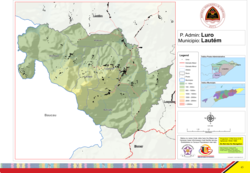Luro, officially Luro Administrative Post (Portuguese: Posto Administrativo de Luro, Tetum: Postu administrativu Luru), is an administrative post (and was formerly a subdistrict) in Lautém municipality, East Timor;[1][2] Luro is also the name of two of its towns (Upper and Lower Luro).
Luro | |
|---|---|
| |
 Rice terraces and water buffalo near Luro | |
 Official map | |
| Coordinates: 8°33′S 126°50′E / 8.550°S 126.833°E | |
| Country | |
| Municipality | Lautém |
| Seat | Upper Luro |
| Sucos | |
| Area | |
• Total | 125.4 km2 (48.4 sq mi) |
| Population (2015 census) | |
• Total | 7,124 |
| • Density | 57/km2 (150/sq mi) |
| Households (2015 census) | |
| • Total | 1,314 |
| Time zone | UTC+09:00 (TLT) |
The main river of the administrative post is the Adafuro, running between Wairoque and Cotamutu and through Afabubu. Principal crops grown in the subdistrict include corn, rice, coconuts, cassava and other vegetables.
History
editIn June 2001 there were severe floods in East Timor, which affected the Luro area.[3] At the end of August 2011, four people died in a clash between two martial arts groups in Baricafa. As a result, Prime Minister Xanana Gusmão ordered the closure of the martial arts clubs.[4]
Geography
editLuro is situated in eastern East Timor in Lautém Municipality. The district covers an area of 125.4 square kilometres (48.4 sq mi) and as of 2015 it had a population of 7,124 people.[5] Luro lies in a valley surrounded by hills and smaller mountains. Legumau (Legumaw, Apara) in the Suco of Lacawa is the highest point in the area at 1,228 metres (4,029 ft) (other sources also state 1221 m and 1297 m).[6]
Rivers include the Adafuro, which flows between Wairoque and Cotamutu and through Afabubu, the Bocilliu, which flows through the western part of Afabubu, the Roumoco near the eastern border of Luro, and the Letana in the southern part of Baricata.[7]
Sucos
editThe area is divided administratively into the following sucos. Population as of 2015 is given:[5]
- Barikafa (Barikafa) (1013)
- Kotamutu (Kotamuto, Kotamuto) (1983)
- Luro (2233)
- Afabubu (Afabubo) (439)
- Lacawa (Lakawa) (645)
- Wairoque (Wairoke, Wairoce, Vairoque) (811)
Economy
editThe administrative post has around 1000 hectares of arable land where rice and corn are grown. 60% of households in Luro grow corn, 54% rice, 51% coconuts, 51% cassava, 44% vegetables and 6% coffee, though many people are dependent on the yields of their gardens. Livestock include water buffalos, cattle, sheep, goats, pigs and especially chickens. In Upper-Luro there are a large number of ducks.[8]
Politics
editThe administrator of the Administrative Post is appointed by the central government in Dili. The politician Jacob Xavier was administrator for Luros for four years in the 1960s.[9] The last administrator appointed by the Portuguese was Jaime Camacho Amaral who served from 1974 to 1975. In 2015 Cecílio Soares the administrator of Luros.[10]
References
edit- ^ "Subdistricts of Timor-Leste". www.statoids.com. 4 May 2010. Retrieved 21 September 2022.
- ^ "Diploma Ministerial n.o 24/2014 de 24 de Julho Orgânica dos Postos Administrativos Preâmbulo" [Ministerial Diploma No. 24/2014 of 24 July Organic of Administrative Posts Preamble]. Jornal da República (in Portuguese). Government of East Timor. 24 July 2014. Archived from the original on 4 March 2016. Retrieved 21 September 2022.
- ^ "East Timor - Floods OCHA Situation Report No. 2". OCHA. 4 July 2001. Retrieved 29 April 2020.
- ^ "Gusmão calls for closing down GAM in Lautém", Diario Nacional, 23 August 2011
- ^ a b "Ergebnisse der Volkszählung von 2015" (in German). Direcção-Geral de Estatística. Retrieved 29 April 2020.
- ^ "Lautém Municipality Development Plan 2002/2003" (PDF). Estatal.gov.tl. Archived from the original (PDF) on 3 February 2011. Retrieved 29 April 2020.
- ^ "Posto-Administrativo-Luro". Estatal.gov.tl. Archived from the original on 10 January 2017. Retrieved 29 April 2020.
- ^ "District Development Plans and Profiles" (PDF). Estatal.gov.tl. Archived from the original (PDF) on 3 February 2011. Retrieved 29 April 2020.
- ^ Douglas Kammen: Fragments of utopia: Popular yearnings in East Timor, Journal of Southeast Asian Studies, 40(2), S. 385–408 June 2009, doi:10.1017/S0022463409000216.
- ^ "Administração Municipal" (in Portuguese). Estatal.gov.tl. Archived from the original on 1 June 2016. Retrieved 29 April 2020.
External links
editMedia related to Luro Administrative Post at Wikimedia Commons
- Luro Administrative Post – information page on Ministry of State Administration site (in Portuguese)
